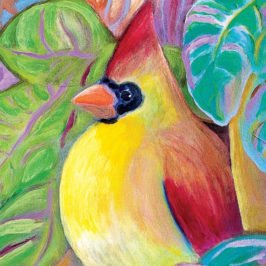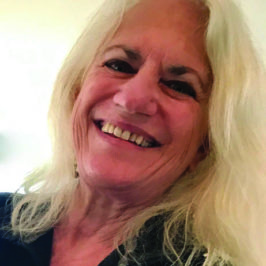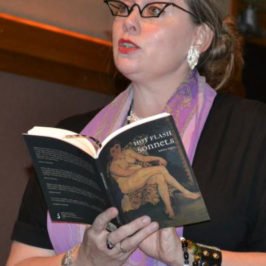


Mangoes, messages and unsolicited advice, with work from Texan writers Parul Shah, Viviane Vives and Janet McCann.
7 minutes
TRANSCRIPT
In case you’d forgotten, now’s a good time to Remember the Alamo. On Feb. 23, 1836, the Mexican army surrounded the Alamo Mission in what’s now San Antonio, TX. The Alamo had 18 cannons and about 150 defenders, including James Bowie of Bowie knife fame and Davy Crockett of coonskin cap fame. Thirteen days later on March 6, the Mexican Army attacked, killing almost everyone inside.
On this edition of Burning Bright, three pieces by writers living in Texas.
Parul Shah said that when she was a child, she didn’t feel her mother’s joy over mangoes, but seeing her son’s excitement about them was a second chance. Here’s an excerpt from her essay “Inheritance.”
At the moment there are 8 mangoes slowly rotting in my spare refrigerator. This refrigerator is where the less loved and/or over-purchased foods go, and the mangoes check both these boxes. I did not buy these mangoes, they were provided by mother, who also provided the 6 quarts of mango pulp that fully furnish the freezer compartment of the spare refrigerator. If you can’t tell, mangoes matter a lot to that lady. In fact, mangoes are second in importance only to breast milk in the minds of my mother and her friends, the Aunties.
Since I can remember, every year one of these ladies excitedly detects the start of mango season and raises the alarm for the others who then careen over to the ethnic grocery stores like moths to a pulpy orange flame to scoop up cases of green and orange jewels. By the time they get home their Hondas are resplendent with the sweet, tropical breath of their haul and their minds are drunk with sentimental nostalgia for their mango-scented childhoods. My mother’s family owned a successful timber business, but don’t ask her to name what sort of wood they built their fortune on. Ask her instead what types of mangoes grew in their orchards and you will get a thorough inventory that she’s held in her heart for over 60 years before she nearly swoons at the recollection of it all. “Kesar, Hafoos, Rajapuri, Jamadar . . .”
After this, she will regale you with stories of how she and her cousins snuck into the orchard just behind their shared family compound in order to thieve mangoes and devour them in the sanctuary of trees, hidden from the watchman’s gaze. The lavishly sweet, Hafoos mangoes in the family orchard were and remain the truffles of India, commanding a dear price if the motley crew of cousins didn’t plunder the treasure first. “Today I found Hafoos!!,” my mom proclaims like a proud pickpocket who scored a $100 bill. I swear she still glances left, then right at the Indian grocery store before discretely tucking a box of “Alphonso” mangoes into her cart and scurrying away like a giddy child thief in an orchard. “Alphonso” mangoes are in fact “Hafoos,” “Hafoos” being the way my Gujarati ancestors pronounced the name of the Portuguese military commander who apparently had something to do with teaching them how to graft mango trees. My mom doesn’t know this, and no one who values their life should tell her because her mango pride is wrapped tightly together with her patriotism for her motherland.
Excerpts from Parul Shah’s memoir “Inheritance,” published in the brand new issue of Passager.
Viviane Vives said that her poem “Facebook Message from a Stranger” was based on a real message she received.
Hi, I’m Anamaia, from Sao Paolo
For almost 6 years I took care of Mr. Lorenzo Benutti, Jr
For a long time I have heard of you
I have heard many stories, adventure and much romance.
I knew you from hearing him talk so much about you.
Mr. Lorenzo Benutti, Jr showed me several pictures
Told how important you were in his life.
I never had the courage to send any kind of message
I did not want to feed the illusions he held.
He dreamed awake with everything you lived.
One day I showed him your page and he cried
I realized that I could not be showing too much,
He got too agitated. Today, I had the courage
Because, unfortunately, he is gone
I want you to know that it is gone.
Until yesterday, you were still the inspirational muse.
In all he was going to paint or sculpt
Always you were the model
Forgive me for sending this message.
But I think he would be glad to know that I sent it
You have always been remembered with much love.
In a way, I knew you. Even in remembrances
You made my friend happy.
If I can get a picture of you, I’ll show you.
From Passager’s 2019 poetry contest, “Facebook Message from a Stranger” by Viviane Vives.
And finally, from Passager’s Winter 2017 issue, Janet McCann’s poem “Tea.”
the twin bed on the porch where the old dog sleeps
looks slept in. beyond wrinkled, sheets worn and holey
bits of dirt, clumps of matted hair.
the twin bed smells like dog and old socks,
sprayed with Febreze it smells even worse.
mangled chew-toys top a feathery pillow.
why don’t you get rid of that thing, the neighbor says
from the kitchen table, she points to the bed
but means the dog. you could have a nice sofa.
in here it smells of Pine-Sol and lemon Pledge.
darkened with just a trace of dog. tea in chipped cups.
she has a new Honda. the old dog snores,
shifts, snores louder through the warped screen door.
“Tea,” Janet McCann.
To read even more work by Texas writers or to subscribe to or learn more about Passager and its commitment to writers over 50, go to passagerbooks.com. You can download Burning Bright from Spotify, Apple and Google Podcasts and various other podcast apps.
For Kendra, Mary, Christine, Rosanne, and the rest of the Passager staff, I’m Jon Shorr.






